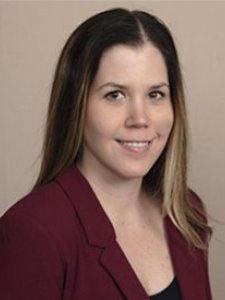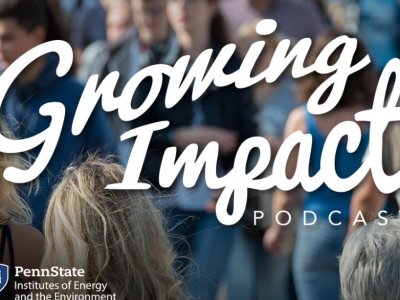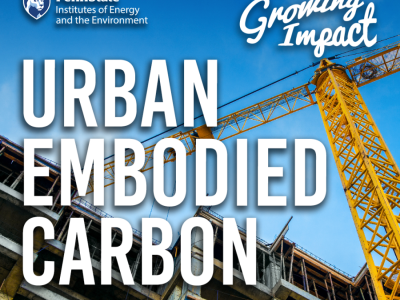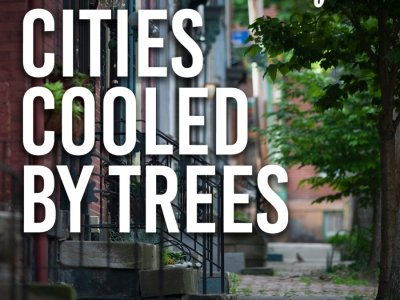23-minute listen | 13-minute read
Creating laws and policies informed by science and facts was not always the primary method used by legislators and policymakers. Until around 2000, policies were often based on a policymaker's intuition. Today, there are concerted efforts to get vetted, fact-based scientific research on numerous topics into the hands of policymakers. One of those topics is climate change and its impacts on human health. Climate change presents a huge array of health problems, and helping policymakers know how to address them as climate change accelerates will continue to be a very important scientific and practical problem.
Transcript
INTRO: Regulators and legislators are going to have a need for information that is purely practical. It's not just, “Is climate science something I should pay attention to?” but “How should these dollars be spent?” or “What are the problems that need to be addressed?”
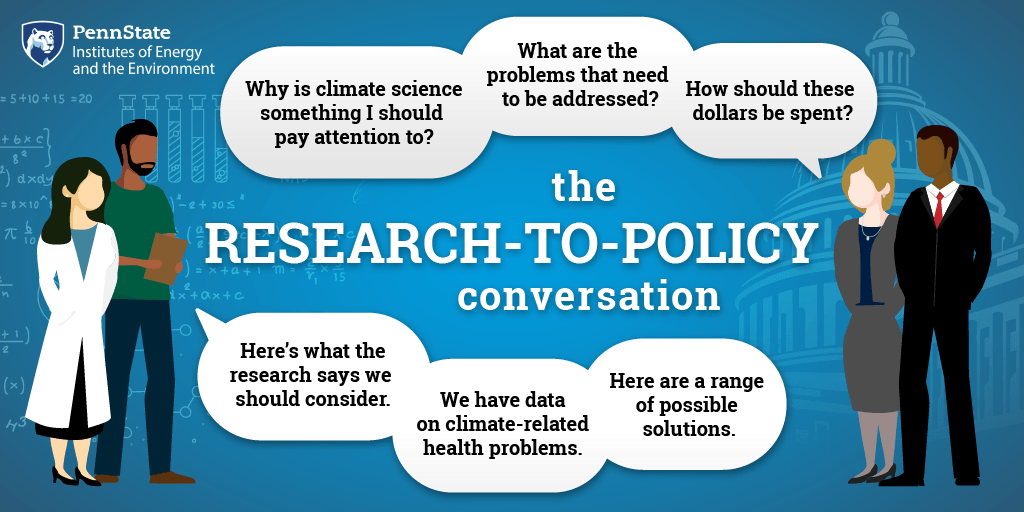
HOST: Welcome to Growing Impact, a podcast by the Institutes of Energy and the Environment at Penn State. Growing Impact explores cutting-edge projects of researchers and scientists who are solving some of the world’s most challenging energy and environmental issues. Each project has been funded through an impactful seed grant program that’s facilitated through IEE. I’m your host, Kevin Sliman.
HOST: Legislators and policymakers work on behalf of the groups they represent. They try to understand and address the challenges of their community and enact policies to address those issues while managing their constituents’ expectations and overcoming their oppositions’ objections. In this episode, I speak with Beth Long and Becky Bascom, two researchers who aim to get more scientific research into the hands of lawmakers. Their project, titled Promoting Solutions to Climate Change and Health Challenges through Science-Policy Communications, is testing strategies for increasing policymaker engagement with that research so more will be used to make policies related to climate change and health.
HOST: So welcome Beth Long and Becky Bascom to this episode of Growing Impact. Thanks for being here.
Beth Long (BL): Thanks for having me. I'm excited to talk about our projects.
Becky Bascom (BB): Glad to be here, Kevin.
HOST: Can you tell the listeners about yourself, maybe your title, and a brief overview of your work? And Beth, could you go first?
BL: Sure. I am an assistant research professor and director of research and evaluation for the Evidence-to-Impact Collaborative at Penn State. My work involves studying strategies for bridging research and policy at both the federal and state levels. This includes two major arms of work that are both relevant to the project. So the first is evaluation of a relational model called the Research-to-Policy Collaboration Model, which aims to build relationships between researchers and policymakers. And the second involves testing different messaging frames to increase policymakers electronic engagement with research using a model that we developed called the science communication optimizer for policy engagement, which is a mouthful, so we call it this SCOPE model. But this involves drawing upon research experts that we in our researcher network that we built through the research to policy collaboration, to create timely and relevant synthases or fact sheets, disseminate them to thousands of policymakers via email and then test different framing strategies using rapid cycle randomized controlled trials.
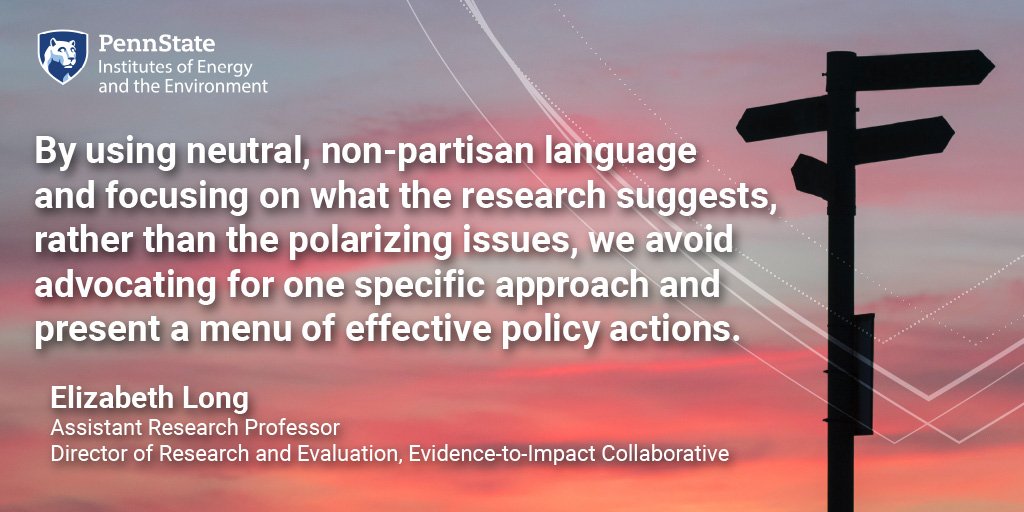
BB: I'm Becky Bascom. I'm a professor of medicine and public health sciences in the College of Medicine, Penn State University. And I'm leading the Health and Environment Theme for the Institutes of Energy and the Environment at Penn State. So what does that mean on a day-to-day basis? I take care of people who have lung diseases and critical illnesses, and also people whose environments have impacted their health. And then I'm really excited to be part of this project with Beth because connecting to the people who can really do something about these problems, meaning the legislators, the regulators, policy people, makes it a bridge, creates a bridge that I think has been lacking. Not for lack of desire, but for a lack of some of these practical things that Beth is developing.
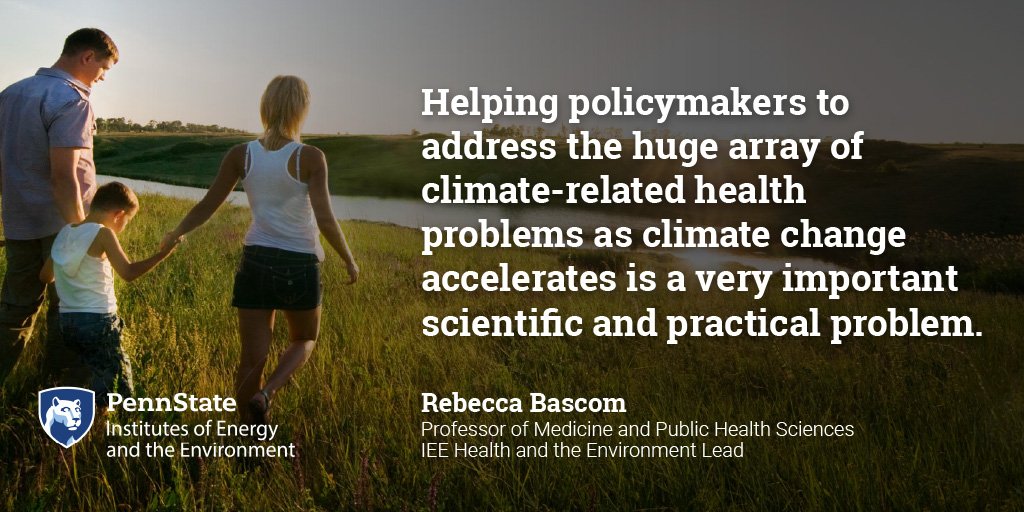
HOST: Your project is titled Promoting Solutions to Climate Change and Health Challenges through Science-Policy Communications. What is the overall goal of the project?
BL: The overall goal of the project is to use the Scope model to test strategies for increasing policymakers' electronic engagement with research related to climate change and health. This will involve recruiting new researchers with this area of expertise into our researcher network, support them in creating fact sheets that are based on the four themes of the health and health and built environment workshops that were led by Becky and then test different email messaging frames were randomized state-level policymakers and staffers into different messaging conditions. The ultimate goal and hope of the project is to increase the amount of research that is being used to make policies related to climate change and health. But for the short-term, specific to this project, we have to track that, starting with email engagement rates. So we'll track how often policymakers will click on the email, how often they'll click on the fact sheet. We embed a link to the fact sheet and then we can track how often they are clicking on it. And then qualitatively the responses that we get to these emails.
BB: The way I think of it as Beth is providing a way for us to learn to create connections between researchers and their knowledge and policymakers and their needs. But in order to do that, there needs to be an efficient connection. And what Beth is testing is how to make an efficient connection.
BL: What's fascinating is that advocacy organizations and lobbyists, they put out these memos about how to increase policymakers’ engagement with research, but more often than not, they're not evaluating it or testing if it actually does work. So that's what this project offers.
BB: Yeah, there's so much, so much room for measurement to improve things and to improve our knowledge about common activities in a way to make them more effective.
BL: Yes
HOST: Especially in the electronic world, right? Where you're not... you may not be meeting face-to-face. You're not shaking hands, you're not... It's a “Did they click my email in the privacy of their room on their iPhone?”
BL: Right.
HOST: Why did your team choose to focus on climate change?
BL: So I alluded to that previously, our network has focused on addressing child and family policy issues, as well as other social issues that are timely. So like substance use and the opioid epidemic. But because climate change and health is becoming a more and more pressing issue every year, we felt like it was important to increase our capacity to be able to address this type of challenge and get this type of research into the hands of policymakers who can hopefully act on it.
BB: To me one of the big things that's driving this is the huge investment the federal government is going to be making in climate-related areas. And so all of a sudden, regulators and legislators are going to have a need for information that is really practical. It's not just, “Is climate science something I should pay attention to?” but “How should these dollars be spent?” or “What are the problems that need to be addressed?” “What are these key intersections?” So I think our elected officials very much wanted to be responsive to the people who elected them. To do that, they'd like to be liked to have information. And this is a way of connecting them to information.
HOST: There are numerous health challenges related to climate change. Can you talk about some of the challenges that you think require immediate attention?
BB: I come at this as someone, as a doctor, and I think some of the immediate needs are to be able to recognize climate-related health problems and to then know how to take care of them. I was at a meeting this morning and, as someone who works on wildfires, was talking about how the wildfires have created burdens of toxicants in people's homes. What should we do about that? What should a person do whose home is not declared a disaster? So it can't qualify for funds. But it has this health concern and health need. I think the health challenges related to the climate had been really laid out by the CDC. And these include respiratory allergies and asthma that snap in my wheelhouse, asthma and cardiovascular disease. There are also waterborne infectious agents. There are worldwide, there's malnutrition and diarrheal disease. There's forced migration. There's huge floodings in areas and the massive displacements. Another big area is heat, heat-related illnesses and the cardiovascular disease and the urban heat islands. Mental health impacts related to climate-related events are getting increasing attention and I think for good reason. Then the vector-borne illnesses. So there's this huge array of health problems. And knowing how to address them as climate change accelerates is a very important scientific problem and also a practical problem.
HOST: I think really important points is how broad the challenge spectrum is.
BB: Well, I think someone once said, “You can't boil the ocean.” And so I think that's why this project is the right project at the right time. So Beth's setting up this network and training people to work in this space allows Penn State's broad knowledge to be brought to bear when there's a specific question.
HOST: Can you explain what science policy communications is?
BL: Yes. So at the broadest level, science communication generally is defined as communicating scientific topics to non-scientists. And that can include a wide range of audiences, so anyone from elementary school students to federal policymakers and beyond. Obviously, this project involves communicating science to policymakers. What this generally involves is translating complex scientific language into language that's more accessible for anybody to understand and then discussing the broad implications of that research. So the so-what, and it can take a lot of different forms as well, so from written articles and newspapers and magazines to presentations or briefings, or even interactive workshops. So in our projects, we're focusing on the delivery of the fact sheet in the hopes that it will result in a meeting with the author of the fact sheet to increase and develop that relationship further.
HOST: Your focus is on policymakers. Why is it important for policymakers to understand the issues as well as the science behind those issues?
BL: If policymakers are to write and influence policies, then they need to be able to understand what the problem is and how we can address that problem as suggested by the research. Obviously, they won't be like the expert in the area, but they do need to have a basic enough understanding to be able to write the most effective policies and not unintentionally write policies that end up doing more harm than good.
BB: I think the other piece of it is that scientists choose what to work on because of the information they get as to what is important. So anytime I'm starting a project, there's a rationale and justification. And what Beth's work is encouraging us to do is to talk to policymakers and legislators about the things that they need to know in order for them to do their job. In the Clean Air Act, for example, there's language about protecting susceptible individual sub-populations with a reasonable margin of safety. And that language in the framing of the Clean Air Act and the congressional language brought about a large amount of scientific investigation to help understand who is susceptible to air pollution. What are levels that can be set to protect people's health? So the Clean Air Act is a great example of a two-way street between legislators and policymakers and scientists.
HOST: What are evidence-based policy solutions? And can you provide some examples that people might be familiar with?
BL: Evidence-based policymaking involves using rigorous research evidence to inform policy decisions as opposed to creating policies based on intuition or what policymakers think works, which is how it was actually until the early 2000s. So policymaking based on evidence instead helps us to create policies that are based on what the evidence suggests actually does work. And I'll let Becky provide some of the examples that are relevant to climate change and health.
BB: One of the features of climate change is that climate events are occurring in places and at times that are unusual as compared to our previous experience. And for example, brief, intense rainfall, highly localized, is all of a sudden becoming a real problem for communities. And this has policy, their policy needs, policy implications. We all know when Katrina, Hurricane Katrina caused massive flooding in New Orleans, and it triggered an enormous federal response. That was an example of a policy-based response to an extreme event. But now there are small areas to get equally intense rainfall and have localized flooding. Homes fill up with water, property becomes damaged, but there's not enough of it in a large enough area to trigger our current policy-based responses. And so it's very important for policymakers to be aware that small communities are being intensely affected. And that we don't have the policy levers to protect them and to help them respond.
HOST: In a polarized society right now, are researchers, are policymakers, are individuals experiencing challenges in receiving information and responding to information because of the polarized state that sometimes our country is finding itself in?
BB: It's a great valid question. And we actually get that question a lot because the work we do can be polarizing, especially things like climate change. But what we've found through our work with the research policy collaboration model and meeting with policymakers, it ends up being a lot less polarized than the media would have you think. Everybody generally wants to do what is best, regardless of which side of the aisle your on. It's just creating language that both sides will relate to and be responsive to, rather than using typical liberal or conservative language, but using more neutral language and focusing on what the research suggests rather than the polarizing issues. The research that we send to them is nonpartisan. So we're not in the business of taking sides. We're non-partisan. And two, we're not lobbying or advocating for one specific approach. It's more of a menu of options. This is what the research says, and these are the different policy actions that you can consider taking, rather than coming at them like a lobbyist would and saying, “we want you to implement this act or do this specific thing.” And I think that approach lends itself well to being received in a better way as opposed to somebody who is more partisan.
HOST: How does your work relate to climate justice?
BL: I can start the response to this one and then let Becky take it from there. But the way I think of it is that research shows that climate change disproportionately burdens people of color and poor communities. And what this work will do is help get that research into the hands of policymakers who can write legislation with that information in mind so that they can help to alleviate the burdens and not cause further harm to those populations.
BB: One of the things that interests me most is getting information to people that allows them to make choices and decisions for themselves that fit their values and their resources, and not to have a one-size-fits-all. So that by having policymakers and regulators have access to the range of solutions, allows them to fit and to pick the solutions that fit their community. So if you are representing a rural community that is having flooding, you may want to know information about solutions there. And if you, if you are in the south of where it is very hot, that may be your interest. So we talked a lot about personalized medicine. And I think access to information about specific solutions is a very important part of climate justice. How resources are allocated, how past burden is weighted in allocating resources for future infrastructure and other activities or allocations is a whole other dimension of impact or trying to change things.
HOST: Are there any plans or anything upcoming that you can discuss or would like to discuss?
BL: Yeah, most definitely. So given that it's a seed grant, we have aspirations to write a larger grant and submit to the National Science Foundation to take this to the next level, do more science communication tests. Write more fact sheets, get more research into the hands of policymakers. But also thinking about ways that we might be able to improve efficiency of the Scope model. So for instance, we might be able to use artificial intelligence to initiate the process of creating the fact sheet and then have a research expert come back in and refine it and add to it. But it would cut down the time demand on the researcher because they wouldn't have to find all the wealth relevant articles. The artificial intelligence program could do that in other ways that we might be able to optimize the model even further the more times that we did this and build on what we learn in these trials.
HOST: Thank you both for spending time. I'm growing impact in discussing your research. I really appreciate your time.
BL: Thanks for having me, Kevin, and I'm happy to answer any questions that anybody has got about participating in the network or about the project overall.
BB: Thank you very much. I hope this motivates people to join in.
HOST: This has been season 3, episode 8 of Growing Impact. To learn more about the Research-to-Policy collaboration and to get involved, visit their website at research2policy.org. That’s research, the number two, policy.org. You can also go to the IEE website to find those links. While you are there, you can learn more about IEE, hear previous episodes, read podcast transcripts, see related graphics from Growing Impact episodes, and so much more. Just visit iee.psu.edu/podcast. Thanks for listening.

